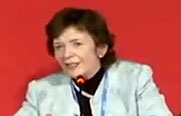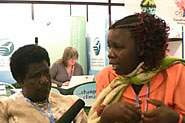September 24, 2018
Mercy Day


Oxfam Ireland and the Mary Robinson Foundation – Climate Justice (MRFCJ) held a meeting to hear the voices of women leaders on climate justice at Trinity College, Dublin, Ireland on April 12th. Mary Robinson, former President of Ireland, joined Jim Clarken, CEO Oxfam Ireland, Constance Okollet and Ursula Rakova of Climate Wise Women for a panel discussion on climate justice.
Mary Purcell, Assistant Director Global Action MIA participated and reports.
Jim Clarken, CEO of Oxfam Ireland spoke about the devastating impact of climate change on developing countries and the need to see the issue of climate change as a human rights and global justice issue. Climate change had contributed to an increase in storms, floods, hurricanes, rise in sea levels and wild fires as well as an increase in health problems such as spread of malaria to countries which had previously been unaffected. Climate change contributed to hunger as food supplies were destroyed. Following on from global climate talks in Copenhagen in 2009 and Cancun in 2010 the world will address these issues in Durban, South Africa at the end of 2011. A budget for climate change must be committed and distinguished from the Overseas Development budget. It should not be taken from this budget.
 |
| Mary Robinson |
Mary Robinson welcomed the two guest speakers from the developing world, noting that 70% of farming in the developing world was carried out by women and emphasising how compelling it was to hear their stories.
She explained “When we focus on the human dimension of climate change, we see the effects of the problem differently and we then approach the solutions differently. Giving voice to the experiences of these women, allowing them to bear witness to their experiences can influence policy outcomes and instruments of adaptation”.
The policy issues which Mary Robinson will be working to achieve at the Durban Conference are as follows:-
 |
| Constance Okollet and Ursula Rakova |
Ursula Rakova Executive Director of Tuele Peisa of the Cartaret Island of the South Pacific, described the urgent situation facing the Carteret Islanders that has required the community to relocate to Bougainville, a larger island that is part of Papua New Guinea. Climate change has played a major role in the destruction of the Carteret atoll, with unprecedented king tides destroying the soil for food production and rapidly covering the land mass forcing the community to move. Ursula explained how the community has been pro-active in meeting the challenge, the delicate process of negotiating with the communities on Bougainville for land and home construction for the Carteret Islanders and, just as essential, the acceptance of her people within the new community.
“Climate change is the central poverty issue of our time, where we see the world’s most vulnerable facing greater droughts, floods, hunger and disease, despite being the least responsible for causing climate change. The Climate Wise Women tour, for me, is about advocacy on climate change and being able to share the stories of my people. Climate change is here to stay and more individual advocacy will result in major climate change action” said Ursula Rakova.
Constance Okollet, Chairperson of the Osukura United Women Network in Eastern Uganda spoke of the dramatic changes in climate that have been occurring in her region of Uganda since 2006. Extreme cycles of drought and rain make it impossible to grow traditional crops, threatening the food security of the community and limiting their ability to earn a modest living. Death by drowning, starvation or disease and disruption to children’s education are some of the other impacts of climate change experienced. Constance told of her own awakening to the causes and effects of climate change at a community meeting organised by Oxfam that led her to understand that the climatic changes her people experienced were not an expression in her words of God’s displeasure with them but were, in fact, caused by mankind.
All speakers emphasised the importance of people acting at the individual as well as the political level to ensure that Climate Change does not threaten the future of the planet.